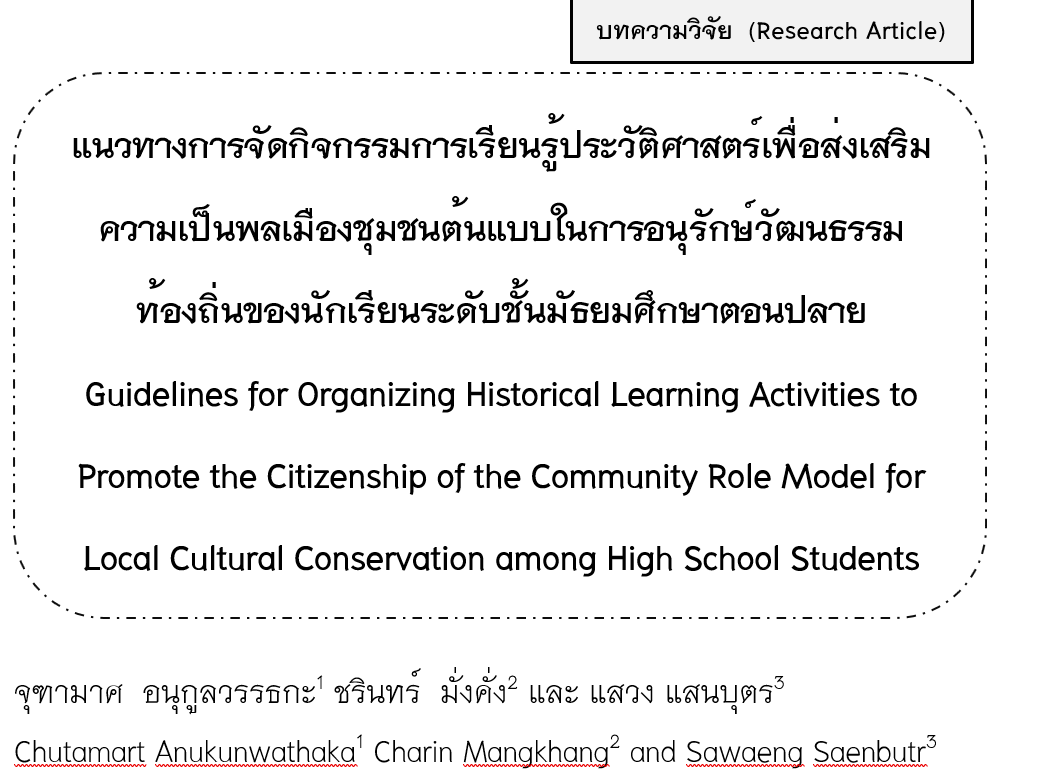Guidelines for Organizing Historical Learning Activities to Promote the Citizenship of the Community Role Model for Local Cultural Conservation among High School Students
Keywords:
Community Role Model, Historical method, Creative local culture conservationAbstract
The objectives of this article were to study the problems of organizing historical learning activities in high school level and to explore guidelines for organizing historical learning activities that promote the citizenship of the community role model for local cultural conservation among high school students. The sample of this study was 10 history teachers in Sukhothai high schools and 10 local community philosophers in local traditions and culture in Sukhothai.
A research instrument was a semi-structured interview. The results of this study indicated that the sample schools had the historical learning management problems as follows: school curriculum did not respond to community needs. Teachers mainly focused on using lecturing as an instructional method and relied on teaching materials from books. Learning materials from the community, personal media (community philosophers) were not used in learning management. Therefore, historical learning activities to promote the citizenship of the community role model for local cultural conservation among high school students should be organized to focus on enabling students to create knowledge by themselves through knowledge of local philosophers to strengthen the citizenship of the community role model for local cultural conservation and to raise the awareness of the importance of local culture, learning about the community background and history. New conservation models should be developed to restore and sustain local culture in the community forever. Systematic learning and working with local people in the community should be conducted. Local philosophers or local wisdom teachers should be access to the opportunity to drive instructional management process in the schools to enable learners to learn from the accumulated experience of citizens of the community role model. When the learning results have become successful, knowledge should be shared and expanded to other people in order to sustainably inherit ways of conserving the local culture of the community.
References
กรมวิชาการ กระทรวงศึกษาธิการ. (2545). คู่มือการจัดสาระการเรียนรู้ กลุ่มสาระการเรียนรู้สังคมศึกษา ศาสนา และวัฒนธรรม. กรุงเทพฯ: โรงพิมพ์องค์การรับส่งสินค้าและพัสดุภัณฑ์.
ขวัญชฎิล พิศาลพงศ์. (2554). กลยุทธ์การจัดการสารสนเทศภูมิปัญญาท้องถิ่น : ภารกิจของห้องสมุดมหาวิทยาลัยต่อสังคมไทย. วารสารอินฟอร์เมชั่น, 18(2), 55-71.
เฉลิม มลิลา นิติเขตต์ปรีชา. (2559). เทคนิคการสอนประวัติศาสตร์ (พิมพ์ครั้งที่ 6). กรุงเทพฯ: โรงพิมพ์แห่งจุฬาลงกรณ์มหาวิทยาลัย.
ชรินทร์ มั่งคั่ง. (2551). องค์ความรู้หลักสูตรและการสอนสังคมศึกษา (พิมพ์ครั้งที่ 1). เชียงใหม่: ลูกช้างนานามีเดียเซ็นเตอร์.
ยุพิน พันธุ์ดิษฐ์. (2554). การศึกษาสภาพและปัญหาการเรียนการสอนตามหลักสูตรแกนกลางการศึกษาขั้นพื้นฐาน พุทธศักราช 2551 ของครูกลุ่มสาระการเรียนรู้สังคมศึกษา ศาสนาและวัฒนธรรมในโรงเรียนมัธยมศึกษา จังหวัดขอนแก่น. (วิทยานิพนธ์ศึกษาศาสตรมหาบัณฑิต). ขอนแก่น: มหาวิทยาลัยขอนแก่น.
ยุวนุช ทินนะลักษณ์. (2549). ปริศนาแห่งภูมิปัญญาท้องถิ่น. กรุงเทพฯ: บริษัท อมรินทร์พริ้นดิ้งแอนด์พับลิชชิ่ง จำกัด (มหาชน).
วินัย พงศ์ศรีเพียร. (2543). คู่มือการจัดกิจกรรมการเรียนการสอนประวัติศาสตร์. กรุงเทพฯ: โรงพิมพ์การศาสนา.
สำนักงานคณะกรรมการการศึกษาขั้นพื้นฐาน .(2558). แนวการสอนประวัติศาสตร์:ประวัติศาสตร์ไทยหลากหลายวิธีเรียน. กรุงเทพฯ: โรงพิมพ์ชุมนุมสหกรณ์การเกษตรแห่งประเทศไทย จำกัด.
สำนักวิชาการและมาตรฐานการศึกษา. (2554). เพื่อนคู่คิด มิตรคู่ครู แนวทางการจัดกิจกรรมการเรียนรู้ประวัติศาสตร์. กรุงเทพฯ: โรงพิมพ์ชุมนุมสหกรณ์การเกษตรแห่งประเทศไทย จำกัด.
สุเทพ อ่วมเจริญ. (2557). SU Model: การประยุกต์การจัดการเรียนรู้แบบสร้างองค์ความรู้. วารสารวิชาการVeridian E-Journal, 7(3), 945-961.
หทัยชนก ไชยวงศ์. (2555). การจัดการเรียนรู้โดยใช้ทฤษฎีความรู้เพื่อส่งเสริมการสร้างองค์ความรู้ทางประวัติศาสตร์สำหรับนักเรียนชั้นมัธยมศึกษาปีที่ 4 โรงเรียนลำปาง. (การศึกษาค้นคว้าอิสระศึกษาศาสตรมหาบัณฑิต). เชียงใหม่:มหาวิทยาลัยเชียงใหม่.

Downloads
Published
How to Cite
Issue
Section
License
Copyright (c) 2021 Phayao University

This work is licensed under a Creative Commons Attribution-NonCommercial-NoDerivatives 4.0 International License.
ผู้นิพนธ์ต้องรับผิดชอบข้อความในบทนิพนธ์ของตน มหาวิทยาลัยพะเยาไม่จำเป็นต้องเห็นด้วยกับบทความที่ตีพิมพ์เสมอไป ผู้สนใจสามารถคัดลอก และนำไปใช้ได้ แต่จะต้องขออนุมัติเจ้าของ และได้รับการอนุมัติเป็นลายลักษณ์อักษรก่อน พร้อมกับมีการอ้างอิงและกล่าวคำขอบคุณให้ถูกต้องด้วย
The authors are themselves responsible for their contents. Signed articles may not always reflect the opinion of University of Phayao. The articles can be reproduced and reprinted, provided that permission is given by the authors and acknowledgement must be given.







